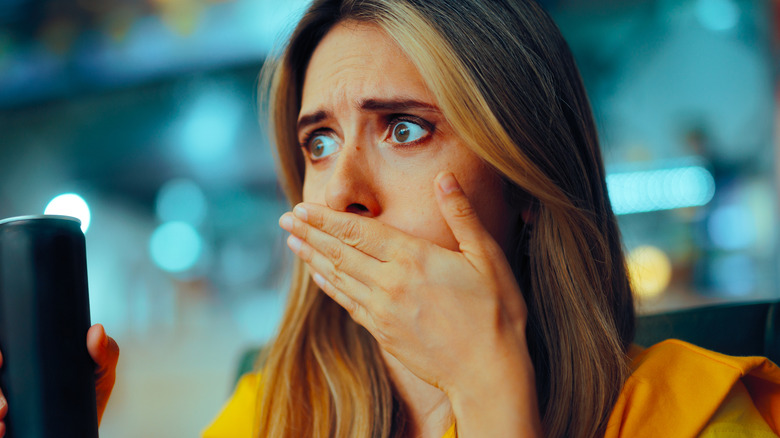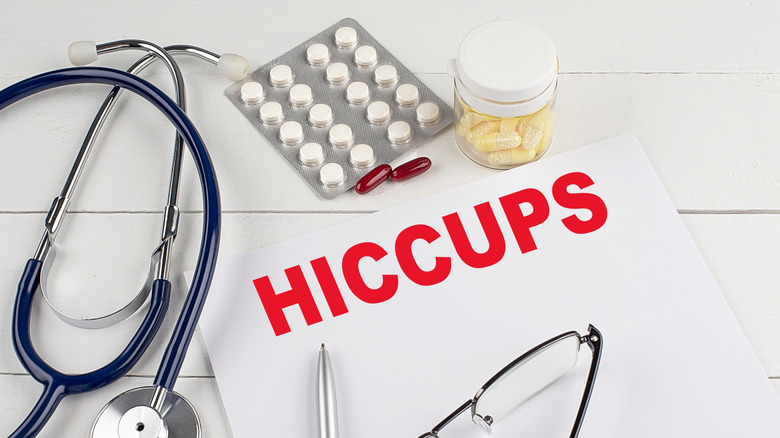How To Get Rid Of Hiccups Using Only Your Breath
Everyone has had hiccups at one time in their life. Even if you think you've managed to dodge this strange physical phenomenon, babies in the womb can actually get hiccups, so you may have had them before you were born. Even though the reasons why people get hiccups aren't fully understood, stopping them is a cinch if you know the right breathing tricks.
If you're hit with a bout of the hiccups, try this: Instead of breathing normally, try breathing in slowly while counting to five and doing the same while you exhale. Holding your breath for 10 to 20 seconds before breathing out slowly can also help, as can breathing into a paper bag or changing your posture. Hugging your knees, for instance, can put pressure on your diaphragm and help it to relax.
Other home remedies involve trying to stimulate a particular cranial nerve called the vagus nerve in specific ways, such as a carotid sinus massage which, involves massaging the carotid arteries, which run up both sides of your neck. To perform this particular technique, you need to lie down and massage the artery on the right side of your neck for 5 to 10 seconds. There are several other hiccup treatments using these "vagal maneuvers" including the Valsalva maneuver which involves lying on your back, taking a breath, and pushing the breath out against your closed mouth while holding your nose for 15 to 20 seconds. While this technique is typically used to restore a normal heart rhythm, it's also an option for trying to stop hiccups.
Home hiccup remedies will vary in effectiveness depending on the individual. But what does the science actually say about stopping hiccups? Well, the evidence points to carbon dioxide as the most important factor.
Home remedies for hiccups
In a 2018 study published in The Clinical Respiratory Journal researchers investigated the mechanisms behind hiccups and found methods for stopping even persistent cases. Two participants with hiccups were asked to perform three kinds of rebreathing experiments involving an air-filled plastic bag, an air-filled plastic bag with a hole, and an oxygen-filled plastic bag. The team then measured the CO2 levels when participants exhaled and inhaled and found that hiccups stopped when the level of CO2 upon inhalation increased at the same level as CO2 upon exhalation and reached approximately 50 millimeters of mercury. Essentially, the study found that CO2 retention resolves persistent hiccups, with the researchers also noting that their findings support those of another study wherein Japanese researchers found that CO2 inhalation in cats suppressed the movements of the muscles associated with hiccups.
Another 2024 study also involved inducing hypercapnia (excessive carbon dioxide in the blood) but additionally interrupted what's known as the neurologic reflex arc, which are the nerve impulses that underlie hiccups. The study, published in Cureus, included 20 patients with hiccups and one patient with prolonged hiccups who were all told to use the "Hiccup relief using Active Prolonged Inspiration" technique. This involved breathing in until the participants couldn't inhale any more. They were then told to keep trying to inhale for 30 seconds, after which they slowly exhaled before resuming their normal breathing pattern. The study found that every single patient reported immediate hiccup relief. Once again, retention of CO2, or hypercapnia, was shown to be an effective way of stopping hiccups, but it seems this noninvasive way of interrupting the neurologic reflex arc also plays a role.
What does the science say about stopping hiccups?
We don't know why we get hiccups, but we do know what's going on physiologically when we get them. These mildly irritating spasms occur when your diaphragm and intercostal muscles start to contract involuntarily, causing your vocal cords to momentarily close, resulting in the "hic" sound. For most of us, hiccups only last for a brief period, though there are those who experience persistent hiccups which can require medical intervention. What we don't really understand is whether hiccups have any benefit. It's thought they might be a vestigial aspect of our primitive respiratory mechanisms and may even play a role in babies trying to strengthen their respiratory muscles in the womb. But there's nothing to suggest they help us as adults.
Of course, the best way to stop hiccups is to try avoiding them altogether. While the muscle spasms themselves are involuntary, you can limit your chances of getting hiccups by eating smaller portions of food, eating slower, and avoiding spicy foods. Alcohol, smoking, and carbonated drinks don't help, either.
With that in mind, hiccups really are just an inconvenience. Like some people's ability to wiggle their ears, they serve no obvious purpose and are just uncomfortable. Luckily, there are plenty of ways you can nip them in the bud.


